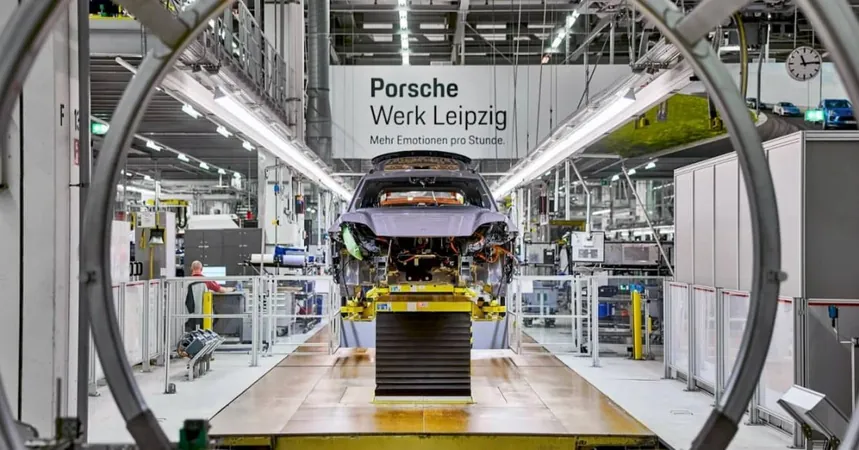
Porsche's $6 Billion Mistake: Why It's Slowing Down in the EV Race
2025-09-20
Author: Wai
Porsche Hits the Brakes on EV Development
In a shocking move, Porsche has announced a significant delay in releasing some of its future electric vehicle (EV) models, a decision that parent company Volkswagen (VW) claims will result in a staggering $6 billion loss in potential profits. This strategy comes at a time when global electric vehicle sales are skyrocketing, leaving many experts questioning Porsche's commitment to innovation.
China Takes the EV Lead
The EV market is currently dominated by Chinese automakers who are rapidly producing affordable and technologically advanced electric cars, outpacing their Western counterparts. These companies are unencumbered by decades of traditional combustion-engine thinking, allowing them to flourish amid a global push for electrification.
Western Automakers in Crisis
Western car manufacturers, caught off guard by the rise of Chinese EVs, are struggling to maintain their positions in both foreign and domestic markets. Despite attempts to impose emergency tariffs to protect local industries, the growth of Chinese brands in Europe continues unabated.
Xiaomi's Surprising Success
In a humbling moment for established brands, Xiaomi, traditionally a smartphone manufacturer, ventured into the automotive sector and stole the spotlight from Porsche. The company set the record for the fastest four-door lap at Nürburgring, outperforming the Porsche Taycan by over 20 seconds, showcasing how quickly the landscape can shift.
Porsche's Slow Response to Competition
In a bid to address what CEO Oliver Blume characterized as a changing automotive environment, Porsche has ironically chosen to slow down their EV plans. Instead, they are prioritizing the development of a high-end SUV that will offer combustion and hybrid options, indicating a reluctance to fully embrace the electric future.
The Misguided Focus on Combustion Engines
Porsche has chosen to extend the availability of its combustion engine models until the 2030s, a tactic that VW now acknowledges will negatively impact their profit margins for 2025. This move has also complicated their partnership with Rivian, as VW’s commitment to combustion technology conflicts with the software designed for electric vehicles.
Denying Electric Demand
Despite Porsche's claims of 'weak demand' for electric vehicles, the reality tells a different story. Sales of EVs in Europe and Germany have risen sharply, with Porsche's own Macan models revealing that nearly 60% of their sales are now electric, highlighting a growing consumer preference that the company seems unwilling to acknowledge.
The Broader Implications of Porsche's Decisions
Blume hopes for more leniency from the EU regarding emissions standards to sustain the production of pollution-heavy vehicles, contradicting the EU’s firm stance on maintaining strict emissions targets. This suggests a broader disconnect between old automotive paradigms and the pressing demands of environmental responsibility.
Climate Change Repercussions
As the climate crisis continues to escalate, the automotive industry's failure to transition to sustainable practices not only jeopardizes public health but also the future of the industry itself. Each moment spent clinging to outdated combustion technologies adds to the costs of climate change, threatening both ecosystems and human lives.
The Future of Automotive Innovation
Porsche's cautious approach may undermine its competitive edge against rapidly advancing global rivals. The need for a decisive shift towards cleaner alternatives has never been more urgent, as continuing down the road of fossil fuels poses grave risks for future generations. In this race against time, the choice is clear: adapt now, or risk becoming obsolete.




 Brasil (PT)
Brasil (PT)
 Canada (EN)
Canada (EN)
 Chile (ES)
Chile (ES)
 Česko (CS)
Česko (CS)
 대한민국 (KO)
대한민국 (KO)
 España (ES)
España (ES)
 France (FR)
France (FR)
 Hong Kong (EN)
Hong Kong (EN)
 Italia (IT)
Italia (IT)
 日本 (JA)
日本 (JA)
 Magyarország (HU)
Magyarország (HU)
 Norge (NO)
Norge (NO)
 Polska (PL)
Polska (PL)
 Schweiz (DE)
Schweiz (DE)
 Singapore (EN)
Singapore (EN)
 Sverige (SV)
Sverige (SV)
 Suomi (FI)
Suomi (FI)
 Türkiye (TR)
Türkiye (TR)
 الإمارات العربية المتحدة (AR)
الإمارات العربية المتحدة (AR)